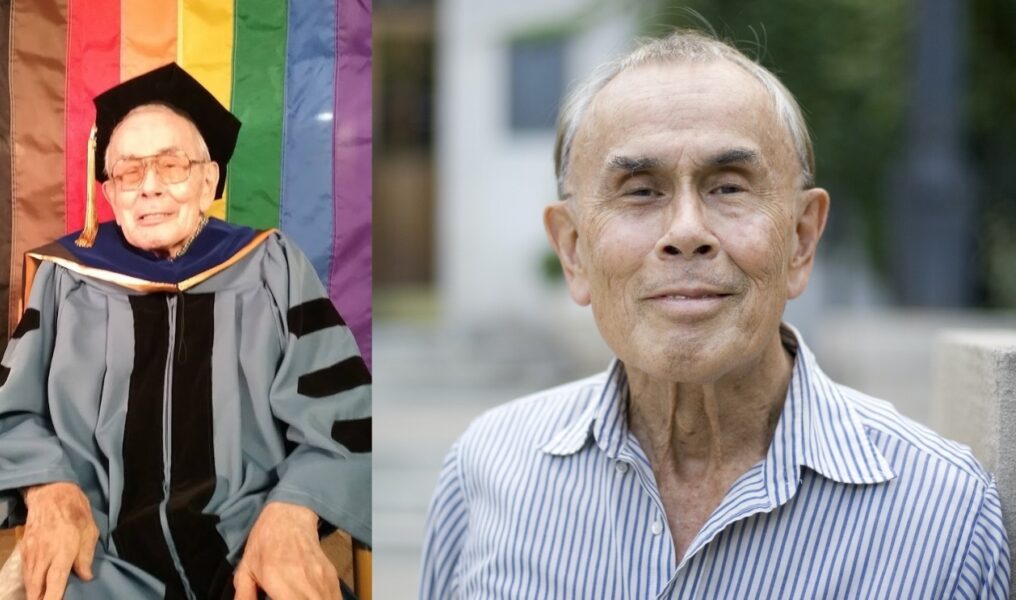Fifty years ago this fall, pioneering activist Jim Toy co-founded, with Cyndi Gair, the Human Sexuality Office at the University of Michigan. Now designated the Spectrum Center, it was the first campus "gay office" in the U.S. established to serve what has since come to be known as the LGBTQ+ community.
At its spring commencement ceremony, held partly online due to COVID-19, the University of Michigan awarded Jim Toy the honorary degree of doctor of humane letters. In presenting the degree, U-M Regent Michael J. Behm saluted Toy's "moral clarity and gentle dignity" in championing social justice.
"Thanks to your vision and courage, LGBTQ students at U-M and institutions of higher learning across the country have access to resources, services, scholarships and programs that celebrate their identities and honor their experiences," Behm said.
Toy also made pre-recorded remarks that were shared at the ceremony.
"Receiving the honor of such a degree brings with it an obligation and responsibility to work for social justice and equity. I invite all of us to join in discharging this obligation and responsibility."
I spoke with Jim Toy about the honor, touching on his life's work and multiple identities in an audio interview via Zoom on May 4. In light of Jim Toy's weakening health, U-M librarian Scott Dennis, one of Toy's caretakers and a longtime friend who has been designated to make medical and legal decisions on his behalf, joined in on the call and contributed to the conversation. The interview has been edited for clarity and length.
We're doing this interview shortly after your 91st birthday, and for more than a year we've been living with this pandemic. How have you been doing?
Oh, I've been doing very well and thanks for all their consideration, for your consideration.
What does it mean to you to be awarded an honorary doctorate from the University of Michigan?
Well, they are very thoughtful and generous and I am grateful to them.
So far as we know, you were the first person in Michigan to come out publicly as a gay man, in a speech you gave at an anti-war rally in Detroit in April 1970. Looking back, how daring was that?
I don't recall feeling that it was daring. My memory is that I felt it was something we had to do so I did it.
Around the same time, you were one of the speakers at the rally in Detroit for the first Pride celebration. This is some of your speech that I want to share. You said, "I know that gay stands for love, and that gay stands for life. Maybe that's all I need to know, and that is all you need to know. So I ask you to come out. Come out for love, come out for life." To what extent do you feel that it is still necessary for LGBTQ+ people to come out?
I think it's absolutely necessary for all of us to come out. And so I am grateful to everybody who takes that step.
Something a lot of people are not familiar with and that is sometimes overlooked is your Chinese heritage.
That's right. I think that's true. It's an essential part of my identity, and for that reason it has shaped my life.
Another aspect of your life has been being an Episcopalian. What do you think of your own journey and the journey the church has taken?
The leadership of the church and the support of the church have been essential in helping shape and guide my identity.
Why is it important to know our history, to seek our history and save our history?
It is important to know, seek and save our history because it is our history, or my history at least, that drives and supports me in my work.
I know that because you were a pack rat, so much of our history has been saved.
Well, I guess that's one positive aspect of being a pack rat. (Laughs.)
This is one pack rat to another, Jim.
That's great.
Scott Dennis: I'll just interject that when we moved Mr. Toy out of his apartment, we sent the Bentley Historical Library an additional 120 boxes of Mr. Toy's papers and received multiple thank yous from the university.
What comes to mind about the emergence of transgender activism and how it has impacted you and all of us?
Transgender activism has inspired and guided me and I hope everyone in our life journey.
As we look to the future, what are your hopes and expectations for the LGBTQ+ community in the years to come?
My hope will be that we members of that community will continue our search for justice and will continue our journey toward the development of our identity.










